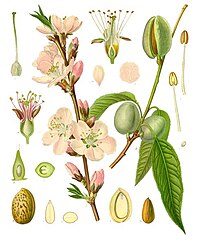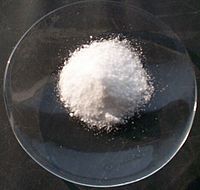
Interaction of peptides obtained from the enzymatic hydrolysis of soybean meal with cyclodextrins: an evaluation of bitterness reduction
Sign Up to like & getrecommendations! Published in 2017 at "Journal of Inclusion Phenomena and Macrocyclic Chemistry"
DOI: 10.1007/s10847-017-0731-7
Abstract: Enzymatic hydrolysis improves the functional and nutritional characteristics of soybean meal proteins. However, the presence of hydrophobic peptides can cause an intense bitterness to the hydrolysate, which is deleterious in terms of final product taste.… read more here.
Keywords: bitterness; enzymatic hydrolysis; meal; soybean meal ... See more keywords

Mary Poppins was right: Adding small amounts of sugar or salt reduces the bitterness of vegetables
Sign Up to like & getrecommendations! Published in 2018 at "Appetite"
DOI: 10.1016/j.appet.2018.03.015
Abstract: Only a quarter of adults and 7% of children consume recommended amounts of vegetables each day. Often vegetables are not initially palatable due to bitterness, which may lead children and adults to refuse to taste… read more here.
Keywords: amounts sugar; bitterness; sugar; sugar salt ... See more keywords

Dicaffeoyl polyamine derivatives from bitter goji: Contribution to the bitter taste of wolfberry.
Sign Up to like & getrecommendations! Published in 2020 at "Fitoterapia"
DOI: 10.1016/j.fitote.2020.104543
Abstract: Although the bioactive compounds in goji have been thoroughly identified and quantified, little information is available on the bitter compounds in the berries, and no systematic works on the substances responsible for their bitterness have… read more here.
Keywords: taste; polyamine derivatives; derivatives bitter; isolated compounds ... See more keywords

Sensory variability associated with anthocyanic and tannic fractions isolated from red wines.
Sign Up to like & getrecommendations! Published in 2020 at "Food research international"
DOI: 10.1016/j.foodres.2020.109340
Abstract: Tannins and anthocyanins are important modulators of the intrinsic quality of red wines, playing a major role in consumer preference and appreciation. Tannins are chiefly responsible for the astringency in wines although their role in… read more here.
Keywords: red wines; tannic fractions; contribution anthocyanic; bitterness ... See more keywords

An advanced technique using an electronic taste-sensing system to evaluate the bitterness of orally disintegrating films and the evaluation of model films.
Sign Up to like & getrecommendations! Published in 2017 at "International journal of pharmaceutics"
DOI: 10.1016/j.ijpharm.2017.07.073
Abstract: Taste detection systems using electronic sensors are needed in the field of pharmaceutical design. The aim of this study was to propose an advanced technique using a taste-sensing system to evaluate the bitterness of an… read more here.
Keywords: taste; system; advanced technique; sensor output ... See more keywords

Characterizing the effect of free amino acids and volatile compounds on excessive bitterness and sourness in defective dry-cured ham
Sign Up to like & getrecommendations! Published in 2020 at "Lwt - Food Science and Technology"
DOI: 10.1016/j.lwt.2020.109071
Abstract: Abstract Some studies indicated that excessive softness, adhesiveness, bitterness and sourness were the common sensory defects of dry-cured ham, which severely belittled consumers' acceptability. To expound the formation of excessive bitterness and sourness in dry-cured… read more here.
Keywords: ham; sourness; amino acids; bitterness ... See more keywords

Activation Spectra of Human Bitter Taste Receptors Stimulated with Cyclolinopeptides Corresponding to Fresh and Aged Linseed Oil
Sign Up to like & getrecommendations! Published in 2022 at "Journal of Agricultural and Food Chemistry"
DOI: 10.1021/acs.jafc.2c00976
Abstract: Linseed oil is rich in unsaturated fatty acids, and its increased consumption could aid in health-promoting nutrition. However, rapid oxidation of linseed oil and concomitant development of bitterness impair consumers’ acceptance. Previous research revealed that… read more here.
Keywords: oil; human bitter; bitterness; taste receptors ... See more keywords

Increasing Oil Concentration Affects Consumer Perception and Physical Properties of Mayonnaise-type Spreads Containing KCl.
Sign Up to like & getrecommendations! Published in 2017 at "Journal of food science"
DOI: 10.1111/1750-3841.13781
Abstract: Reducing sodium intakes remains a global challenge for the food industry. KCl is a potential salt substitute but imparts bitterness when used at high concentrations. Little is known about how oil concentrations (OC) affect consumers'… read more here.
Keywords: containing kcl; physical properties; bitterness; spreads containing ... See more keywords

Sodium Chloride Suppresses the Bitterness of Protein Hydrolysates by Decreasing Hydrophobic Interactions.
Sign Up to like & getrecommendations! Published in 2019 at "Journal of food science"
DOI: 10.1111/1750-3841.14419
Abstract: The formation of bitter off-flavor is a long-existing issue during food protein hydrolysis. The aim of this study is to determine the mechanism of sodium chloride (NaCl) suppressing the bitterness of protein hydrolysates. In this… read more here.
Keywords: protein; hydrophobic interactions; decreasing hydrophobic; protein hydrolysates ... See more keywords

Caffeine Bitterness is Related to Daily Caffeine Intake and Bitter Receptor mRNA Abundance in Human Taste Tissue
Sign Up to like & getrecommendations! Published in 2017 at "Perception"
DOI: 10.1177/0301006616686098
Abstract: We investigated whether the abundance of bitter receptor mRNA expression from human taste papillae is related to an individual’s perceptual ratings of bitter intensity and habitual intake of bitter drinks. Ratings of the bitterness of… read more here.
Keywords: taste; caffeine; mrna abundance; bitterness ... See more keywords

Modulating the bitterness of Empeltre olive oil by partitioning polyphenols between oil and water phases: Effect on quality and shelf life
Sign Up to like & getrecommendations! Published in 2019 at "Food Science and Technology International"
DOI: 10.1177/1082013218795803
Abstract: Bitterness is a positive sensorial attribute of olive oil that mainly depends on phenol concentration. However, excessive bitterness may be unpleasant for consumers. The aim of this investigation was to evaluate if partitioning polyphenols between… read more here.
Keywords: oil water; bitterness; empeltre olive; oil ... See more keywords